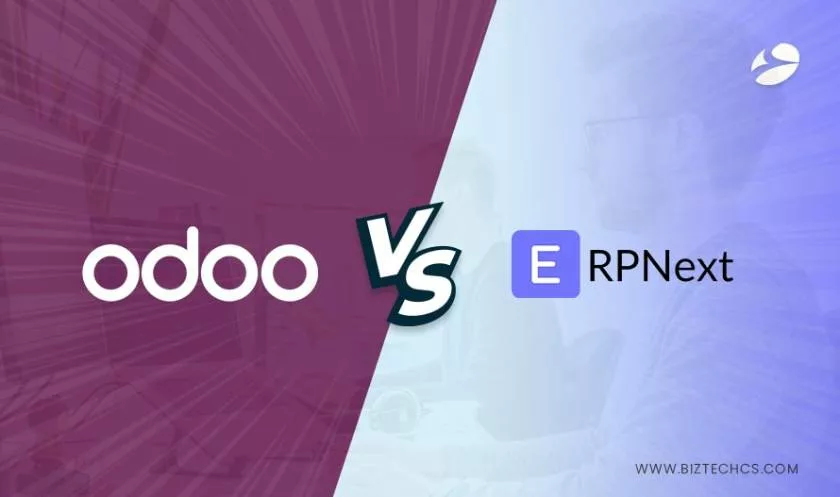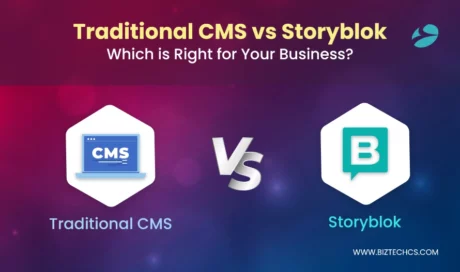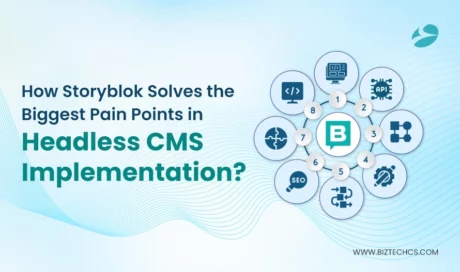Odoo Vs ERPNext: Which is The Right ERP Solution For Your Business in 2024?
19 Sep, 2023
7 min read
19 Sep, 2023
7 min read
Table of Content:

ERP is the backbone of efficient operations in the era of data-driven decision-making and rapid market changes. The presence of an ERP system within your organization gives you a comprehensive and integrated system, helpful for managing your core business functions.
But, choosing the right ERP based on your business needs is a lot more difficult than you realize; especially with a wide range of ERP options at your exposure. In today’s blog post, we will talk about two popular ERP solutions, ERPNext and Odoo development, that have gained a lot of attention in the enterprise resource software market.
So without further ado, let’s compare Odoo vs ERPNext and help you make an informed decision about the best ERP fit for your business.
But before that, let’s brief you about the two ERPs!

Odoo and ERPNext are both popular Enterprise Resource Planning (ERP) solutions that can streamline and integrate various aspects of business operations on a single platform.
ERPNext, an open-source technology, offers a comprehensive set of capabilities to cater to the diverse needs of businesses. Along with traditional ERP functions like accounting, inventory management, and supply chain management, ERPNext also includes features for project management, asset management, and helpdesk capabilities. Targeted at small and medium-sized businesses, ERPNext provides an affordable solution, especially for organizations seeking to automate manual processes and improve overall efficiency.
On the other hand, Odoo is a leading ERP software that not only comprises core ERP functionalities but also integrates Customer Relationship Management (CRM) capabilities as part of its package. This all-in-one solution is suitable for both small and larger businesses, allowing them to manage their operations, sales, marketing features, and customer interactions all from a central platform. With a wide variety of modules and options, Odoo allows businesses to tailor their ERP system to fit their specific business requirements.
As per reports, the Odoo market share as an ERP solution is 9.75%, greater than that of SAP Business One and Microsoft Dynamics AX, which stand at 7.89% and 7.88% respectively.
In conclusion, while ERPNext caters to organizations looking for a broad spectrum of ERP functionalities, Odoo stands out for its combination of ERP and CRM features, making it a strong contender for businesses seeking a comprehensive one-stop solution.
Now that you are familiar with the two ERP business systems, let’s look at the advantages and disadvantages of adopting these ERP systems.
Advantages of Odoo
Advantages of ERPNext
Disadvantages of Odoo
Disadvantages of ERPNext
When it comes to choosing the right ERP solution for your business in 2024, two popular options are Odoo and ERPNext. Both these platforms offer a wide range of features and functionality to streamline your business operations.
| Odoo | ERPNext | |
|---|---|---|
| User Interface and Experience | Features a user-friendly and intuitive interface, suitable for both beginners and experienced users. | It features an intuitive and straightforward user interface that aims to simplify the use of ERP software for a wide range of users, including those who may not have extensive technical backgrounds. |
| Modules | Offers a wide range of pre-built modules covering various business functions. For example, CRM, e-commerce, billing, accounting software, manufacturing, warehouse, project management, and inventory management. | Provides a comprehensive set of ERPNext modules, including CRM, ERPNext accounting, inventory, Human Resource management, and more. |
| Applications | You can find over 39,000 apps in the Odoo store that are fully compatible with the ERP system. | ERPNext has over 40 core modules or applications available for use. While it provides a wide range of applications for ERPNext inventory, HR, eCommerce capabilities, sales, and purchases, it might not be as extensive as of Odoo’s. |
| Customization and Scalability | Highly customizable, allowing extensive tailoring to match specific business processes. Highly scalable, making it suitable for small businesses to large enterprises. | Provides customization options through user-friendly forms and scripting capabilities. It’s also scalable, adapting to business growth. |
| Third-Party Integrations | Supports numerous integrations with third-party applications and services through its app store. | Allows integrations with third-party apps and services, with a focus on open-source and community-driven development. |
| Reporting and Analytics Option | Offers robust reporting and analytics tools with customizable dashboards and real-time data access. | Provides reporting and analytics capabilities to help businesses gain insights into their operations. |
Odoo and ERPNext are two popular ERP solutions that offer diverse deployment options to suit the needs of different businesses. Let’s compare and contrast the deployment options available for both systems.
I. Cloud-Based Deployment
The cloud-based option allows businesses to access their ERP system through the internet, without the need for in-house infrastructure or technical expertise. This provides scalability as the system can easily handle increased users and data. Additionally, the software cloud offers flexibility as users can access the system from anywhere and on any device. However, ongoing subscription costs may be a concern for some businesses.
Odoo: Odoo’s cloud-based solution is known as Odoo Online. Users can subscribe to Odoo’s cloud service, where Odoo manages the infrastructure, updates, and maintenance. It’s a convenient option for businesses looking to get started quickly without the hassle of managing servers.
ERPNext: It also provides a cloud-based deployment facility where users can subscribe to ERPNext’s cloud solution, which is hosted on their servers.
II. On-Premise Deployment
It provides complete control and customization but requires dedicated IT resources and infrastructure.
Odoo: Odoo allows for on-premises deployment, where businesses can install and host Odoo on their own servers. This option provides more control over the infrastructure and data but requires IT expertise to set up and maintain the servers.
ERPNext: Like Odoo, ERPNext can also be deployed On-Premise. Users can download the ERPNext source code and install it on their own servers. This self-hosted option offers complete control and customization but comes with the responsibility of server management.
III. Hybrid Deployment
A hybrid solution combines both cloud and on-premise deployment, allowing businesses to leverage the benefits of both options.
Odoo: Odoo supports hybrid deployments, allowing businesses to mix and match cloud-based and on-premises solutions. For example, a company might use Odoo Online for certain branches or departments and host an on-premises Odoo instance for others. This flexibility caters to businesses with diverse needs.
Ultimately, the right deployment option for your business depends on various factors such as budget, technical expertise, and specific requirements. While Odoo offers a wide variety of deployment options, ranging from cloud-based to on-premise and hybrid solutions, ERPNext provides similar flexibility with its cloud-based and on-premise choices.
It’s essential to evaluate your business’s scalability needs and cost considerations to make an informed decision.
When it comes to choosing the right ERP solution for your business in 2024, security and data privacy should be top priorities. Both Odoo and ERPNext understand the importance of protecting sensitive business data and user privacy through the implementation of encryption protocols, access controls, and backup procedures.
Let’s check the security measures taken by each ERP system to protect the sensitive information of your business.
Odoo:
ERPNext:
Odoo and ERPNext, both popular enterprise resource planning (ERP) solutions, offer different pricing models to cater to the diverse needs of businesses.
Odoo follows a modular pricing structure, allowing businesses to select and pay for the specific features and functionalities they require. It offers a vast range of free modules encompassing basic business operations such as accounting, sales, and project management. Additional paid modules are available for more specialized functionalities, such as e-commerce capabilities or advanced manufacturing processes. The cost of these paid modules varies according to the specific requirements of each business.
On the other hand, ERPNext follows a subscription-based pricing model. It offers a single subscription plan with access to all its features and modules. This pricing model simplifies budgeting and provides businesses with a comprehensive suite of applications for their entire company operations. The subscription cost is based on the number of users, ensuring scalability as businesses grow.
Both Odoo and ERPNext offer affordable costs, making them suitable for small and medium-sized enterprises. However, it is important to consider the business requirements and select the ERP solution that aligns best with the specific needs and budget of the organization.
Having a robust support system and an active community is paramount when choosing an ERP solution. It allows businesses to address their specific requirements and resolve issues promptly. Furthermore, an engaged community provides valuable insights, best practices, and peer-to-peer support.
| Support Aspect | Odoo | ERPNext |
|---|---|---|
| Official Support | Email, Phone, and Live Chat | Offer official support plans with different levels of service and response times |
| Documentation | extensive official documentation, user guides, and tutorials | comprehensive documentation and user guides |
| Community Involvement | Has an active community of users, developers, and partners who contribute to forums and discussions | Encourages community involvement and has active forums and discussion boards |
| Community Forums | Hosts community forums where users and developers can ask questions, share insights, and seek help | Features community-driven forums for discussions and problem-solving |
| Knowledge Base | Articles, FAQs, and resources | FAQs and articles |
| Training Resources | Offers online training courses and certifications | It also offers online training courses and certifications |
You can compare the two ERPs based on the various factors mentioned above. Make sure you are clear about your business objectives and plans so you can decide on the best ERP solution for your enterprise.
Wondering how Odoo (all-in-one software solution) can compare to other leading ERPs like SAP and Oracle Netsuite ERP? You can also check our Odoo vs SAP detailed comparison.
Let’s take some real-world examples to see how the two ERP implementations are working well for businesses and how these helped overcome critical business challenges.
I. Intevlag
The Netherlands-based flag manufacturer was in need of a robust ERP in manufacturing system that would help them connect with resellers and sell their products online. They faced a myriad of challenges in their existing system like shipping complexity, product configuration, price determination, and problems communicating with suppliers and customers.
When Intervlag reached out to Biztech, we leveraged the power of Odoo ERP to deliver product customization, shipping simplification, and weather integration and created a supplier portal, loyalty program, and price calculation tool.
We transformed Intervlag’s online presence by upgrading its website and implementing new, tailor-made features. These enhancements by Biztech have significantly improved Intervlag’s operational efficiency and customer service.
II. Teabox
Founded by Kausshal Dugarr in 2012, Teabox hails from the gardens of Darjeeling and Assam. Being in the manufacturing sector, their processes were complex. While their orders were being managed by a vendor, they couldn’t overlook the dire need for a solution that could manage all the raw materials acquisition, material requirements planning, marketing to manufacturing, packaging, and supply activities.
Teabox leveraged ERPNext’s various modules such as manufacturing, buying, selling, stock, and accounts at 100% capacity. They are trying to expand their brand globally and become one of the largest tea sellers in India.
These case studies and success stories illustrate that both Odoo and ERPNext have contributed significantly to the growth and efficiency of various businesses. You may consider Odoo as an ERPNext alternative or vice versa. The choice between them should be based on a careful analysis of specific business needs and objectives.
When it comes to choosing the right ERP solution for your business in 2024, two popular contenders are Odoo and ERPNext. Both offer a range of benefits and features but also have their drawbacks to consider.
As you weigh the advantages, disadvantages, features, and pricing of both Odoo and ERPNext, it’s essential to consider your specific industry, business size, scalability requirements, and long-term goals.
Additionally, reaching out to their respective communities, trying out demos, and consulting with ERP experts can provide further clarity on which solution aligns best with your business objectives.
Odoo shines with its user-friendly interface and extensive app store, making it a great fit for businesses looking for a comprehensive and intuitive platform. On the other hand, ERPNext impresses with its affordability and strong focus on open-source values, making it an excellent choice for budget-conscious organizations.
Decided which ERP to choose to boost your business operations? Decided or not, we can help you with the next steps! Right from consultation, design, and development, we can help you with strategized Odoo development. Talk to our ERP experts for more insight on your ERP needs and get the much-needed technical assistance.

Storyblok
31041
By Devik Gondaliya
02 Apr, 2025

Storyblok
32011
By Devik Gondaliya
01 Apr, 2025

Storyblok
32590
By Devik Gondaliya
27 Mar, 2025